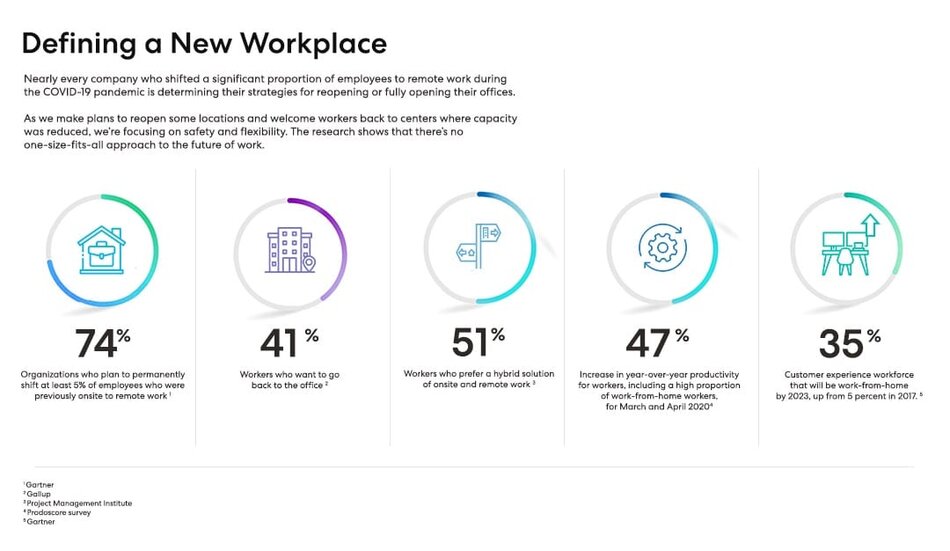Ubiquity President and CEO Matt Nyren reflects on the lessons of COVID-19 and how customer support—and just about any kind of work—will have to be flexible enough to accommodate more choices for clients and employees to thrive going forward.
By Matt Nyren, President and CEO, Ubiquity
Ubiquity specializes in supporting complex and often highly regulated businesses. As a natural result, none of our clients had previously expressed any interest in a work-from-home solution. We serve more than a hundred financial services and healthcare brands, and these organizations simply felt most comfortable supporting their customers from our PCI-certified, SOC 2- and HIPAA-compliant centers.
Fast forwarding to 2020, and the demand for secure work-from-home solutions has shot up exponentially—among existing clients and prospects. Luckily, we were not caught flat-footed. Because of our strong security pedigree and months of advance planning, we were able to immediately launch a secure work-from-home solution when contact centers were restricted or in some cases closed altogether. We’ve also been able to unequivocally demonstrate that we can deliver a flexible work-from-home solution without compromising security or quality.

Solving for Security
The ability to embrace remote work has been vital to Ubiquity’s success and our ability to support our partners. What made it easier for us to take that leap was our robust and thoroughly tested security and compliance infrastructure. While some outsourcers dedicate a floor or a wing of their operations to comply with strict security and privacy requirements, we’ve always taken the extra effort to secure our entire operation. Work-from-home became a simple extension of what we’ve always provided for all Ubiquity clients.
It’s true that in some locations internet bandwidth presented challenges, but we specifically designed our work-from-home solution to optimize bandwidth and reduce dependency on home connection speeds. We also adapted our physical security protocols to the remote environment and offered clients sophisticated security enhancements.
We were able to transition the majority of our team members to remote work quickly. Still, not every employee was in a position to work from home and not every client was ready to sign off on this approach, so we continued to flex. We reconfigured our use of space in our centers to move clients into additional geographies or accommodate new programs—all while employing social-distancing requirements to keep our team members safe.
In Manila, home to some of our largest sites, we responded to the enhanced community quarantine by providing transportation, lodging and meals to ensure that a certain percentage of our employees could still come into the office safely.
As things begin to open up, we are expanding our footprint within the Philippine capital to accommodate our workforce across three centers instead of two. We’re also looking at opening facilities in new international geographies to support our growing business. I’m proud to say that in the midst of this global health crisis, we’ve onboarded more than 20 new clients, with more on the way.
People First
Our agility and resilience in this moment have helped us attract new clients to be sure. But the real key to our success is the same as it’s always been—our people.
The Ubiquity team has risen to every challenge, including those that come with working at home such as caring for family members or loneliness. Technical and security aspects of building an effective work-from-home solution are critical, but I can’t stress enough how important it’s been to ensure high levels of engagement for individual agents, teams and the organization as a whole. Mitigating feelings of isolation and maintaining a sense of community have been and will continue to be essential. From 1:1 syncs and coaching sessions to virtual group meetups and recognition for top performers (even a remote talent show!) we remain committed to maintaining our team-oriented culture on a professional and personal level across four continents.
As someone who spends up to 50% of my time traveling to each location, working from home has been a major adjustment. Phone calls and video chats—shaggy hair and all—have been a lifeline and especially important when welcoming new hires to Ubiquity. Communicating our values is always imperative, but it requires special attention when we can’t be together face to face.
Multiple Models Will Thrive
As we think about the future of our business, we’re focusing on giving our clients and employees choices. We are deploying multiple models that include onsite, offsite or hybrid approaches. Although we anticipate there will be somewhat less reliance on physical facilities, our centers will remain an integral part of our service delivery. To ensure the safety of our teams, we will maximize in-person engagement while maintaining social distance and increasing sanitization.
As I noted at the beginning of this article, we believe remote delivery does work for customer support. We’ve seen no fundamental differences in performance between remote and onsite teams. High quality and efficient customer support that improves customer satisfaction and Net Promoter Scores is possible onsite and at home. In fact, we’re in the midst of hiring hundreds of agents to work from home and in our expanding global network of contact centers.
The bottom line is this: With the right mix of security, technology and employee engagement, world-class customer support can be delivered from anywhere.
Matt Nyren is the co-founder, president and CEO of Ubiquity.
Learn more about how Ubiquity can help you deliver the best customer experiences imaginable.
To provide the best experiences, we use technologies like cookies to store and/or access device information. Consenting to these technologies will enable us to process data such as browsing behavior or unique IDs on this site. Not consenting or withdrawing consent may adversely affect certain features and functions.